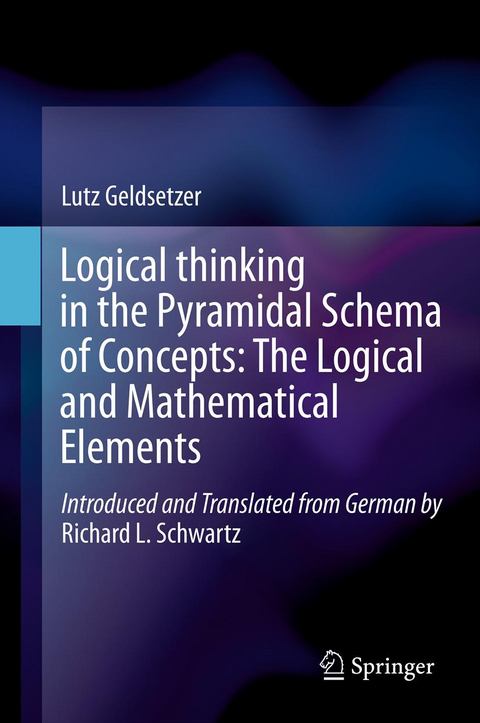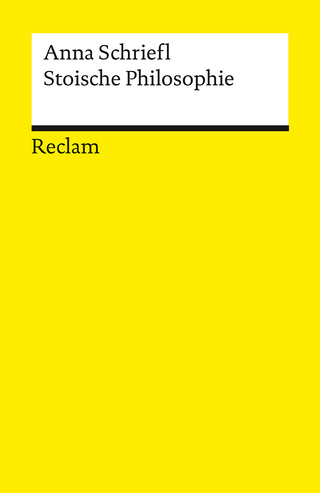
Logical Thinking in the Pyramidal Schema of Concepts: The Logical and Mathematical Elements
Springer (Verlag)
9789401784443 (ISBN)
Additionally, the author shows that logical connectors are of fundamentally different types: only one sort generates propositions with truth values, while the other yields conceptual expressions or complex concepts. On this basis, strong arguments are developed against adopting the non-discriminating connector definitions implicit in Wittgensteinian truth-value tables. Special consideration is given to mathematical connectors so as to illuminate the formation of concepts in the natural sciences. To show what the pyramidal method can contribute to science, a pyramid of the number concepts prevalent in mathematics is constructed. The book also counters the logical dogma of ‘false’ contradictory propositions and sheds new light on the logical characteristics of probable propositions, as well as on syllogistic and other inferences.
Prof. Lutz Geldsetzer is Professor Emeritus of Philosophy at the Heinrich-Heine Universitaet in Duesseldorf, Germany, where he has taught since 1963 and where from 1971 to 2002 he directed the research department for general theory of science in the Institute of Philosophy. In 1970, he co-founded the internationally recognized Journal for General Philosophy of Science/Zeitschrift fuer allgemeine Wissenschaftstheorie which he co-edited until 2009. He has published books and articles on a wide range of philosophical topics, and edited several series of philosophical dictionaries, classics in various areas including hermeneutics, and specialized bibliographies. He has been a visiting professor at universities in the United States, the People's Republic of China, Italy, France and Germany. He studied Philosophy, Social Sciences, Law and Languages at the Johannes-Gutenberg Universitaet in Mainz, Germany, where he received his Ph.D. in 1961, and did postgraduate work at the Sorbonne in Paris in 1961-62.
Preliminaries.- 1. Concepts.- 2. Logical Connectors (Junctors).- 3. Definitions.- 4. Propositions.- 5. Inferences.- 6. Theories.- 7. Axioms and especially on the genuine Axioms of Logic.
| Zusatzinfo | XLIV, 140 p. |
|---|---|
| Verlagsort | Dordrecht |
| Sprache | englisch |
| Maße | 155 x 235 mm |
| Themenwelt | Geisteswissenschaften ► Philosophie ► Allgemeines / Lexika |
| Geisteswissenschaften ► Philosophie ► Logik | |
| Mathematik / Informatik ► Informatik ► Theorie / Studium | |
| Mathematik / Informatik ► Mathematik ► Allgemeines / Lexika | |
| Mathematik / Informatik ► Mathematik ► Logik / Mengenlehre | |
| Schlagworte | Axioms of logic • Classification concepts • Coherence vs. incoherence as truth-value conditions • Conceptual pyramid • Connectors, expression-forming vs. proposition-forming • Contradiction as propositional truth-falsity • Contradictory concepts • Definition by equation • Dispositional concepts • Equation as equivalence • Intensional-extensional logic • Mathematical connectors • Mathematical Logic • Number concept • Porphyrian trees logic • possible worlds • Probability, logical and mathematical • Pyramidal graph logic • Pyramidal logic • Pyramidal logical formalism • Sense and reference • Sense experience • Theories, conceptual hard-core and propositional demonstration • Visualization Logic • Visualization of logical elements • Wittgensteinian truth-value table |
| ISBN-13 | 9789401784443 / 9789401784443 |
| Zustand | Neuware |
| Informationen gemäß Produktsicherheitsverordnung (GPSR) | |
| Haben Sie eine Frage zum Produkt? |
aus dem Bereich


